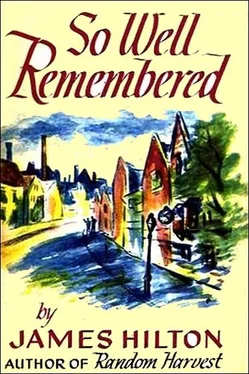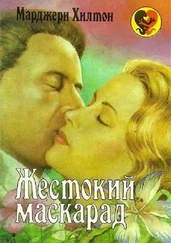Джеймс Хилтон - So Well Remembered
Здесь есть возможность читать онлайн «Джеймс Хилтон - So Well Remembered» весь текст электронной книги совершенно бесплатно (целиком полную версию без сокращений). В некоторых случаях можно слушать аудио, скачать через торрент в формате fb2 и присутствует краткое содержание. Год выпуска: 1945, Жанр: Проза, на английском языке. Описание произведения, (предисловие) а так же отзывы посетителей доступны на портале библиотеки ЛибКат.
- Название:So Well Remembered
- Автор:
- Жанр:
- Год:1945
- ISBN:нет данных
- Рейтинг книги:5 / 5. Голосов: 1
-
Избранное:Добавить в избранное
- Отзывы:
-
Ваша оценка:
- 100
- 1
- 2
- 3
- 4
- 5
So Well Remembered: краткое содержание, описание и аннотация
Предлагаем к чтению аннотацию, описание, краткое содержание или предисловие (зависит от того, что написал сам автор книги «So Well Remembered»). Если вы не нашли необходимую информацию о книге — напишите в комментариях, мы постараемся отыскать её.
So Well Remembered — читать онлайн бесплатно полную книгу (весь текст) целиком
Ниже представлен текст книги, разбитый по страницам. Система сохранения места последней прочитанной страницы, позволяет с удобством читать онлайн бесплатно книгу «So Well Remembered», без необходимости каждый раз заново искать на чём Вы остановились. Поставьте закладку, и сможете в любой момент перейти на страницу, на которой закончили чтение.
Интервал:
Закладка:
Sombrely he reached his house and, as he entered it, suddenly felt ALONE. Which made him think; for he had been just as alone ever since Livia had left six months before; and if he had not felt it so much, that proved how hopefully, in his heart, he had looked upon the separation. She would come back, he must all along have secretly believed; or at least the bare possibility had been enough to encourage his ever-ready optimism about the future. Night after night he had entered his empty house, made himself a cup of tea, spent a last hour with a book or the evening paper, and gone to bed with the tolerable feeling that anything could be endured provided it might not last for ever. There was even a half-ascetic sense in which he had found tolerable his enforced return to bachelorhood, and there was certainly a peace of mind that he knew her return would disturb—yet how welcome that disturbance would be! And how insidiously, behind the logic of his thoughts, he had counted on it!… He was aware of that now, as he entered his house and felt the alone-ness all-enveloping. Heavily he climbed the stairs to his bedroom and began to throw a few necessary articles into a suitcase. Even that he did with an extra pang, for it reminded him of times when Livia had packed for him to attend meetings or conferences in other parts of the country; she was an expert packer as well as very particular about his clothes. And the first thing she did when he returned was to unpack and repair the ravages of his own carelessness about such things. There was that odd streak of practicality in her, running parallel to other streaks; so that she not only loved classical music but could repair the gramophone when something went wrong with it. And the garden that Winslow had admired was further evidence; it had been a dumping-ground for waste paper and old tin cans before she started work on it. Recent months without her attention had given the weeds a chance, but still her hand was in everything, and the roses seemed to have come into special bloom that week as if expecting her return. In a sort of way she had done for that patch of waste land what George himself had tried to do for Browdley as a whole (yet would never have bothered to do for his own back garden); but of course she had done it without any civic sense, and for the simple reason that the place belonged to her. George sighed as he thought of that, recognizing motives that were so strong in her and so absent in him; but with the sigh came a wave of tolerance, as for someone who does simple natural things that are the world’s curse, doubtless, but since they cannot be changed, how pointless it is to try. Yet the world MUST be changed… and so George’s mind ran on, facing an old dilemma as he snapped the locks on his suitcase. All at once the house, without Livia in it, became unbearable to him; he knew he would not sleep that night, and as his train left early in the morning he might as well not even go to bed; he would take a walk, a long walk that would tire him physically as well as clarify some of the problems in his mind. He went downstairs and put on a hat, then passed through the partition-doorway that separated the house from the printing-office. It was the middle of the week, the slack time between issues; copy for the next one lay littered on his desk —mostly local affairs—council meetings, church activities, births, marriages, and funerals. Occasionally he wrote an editorial about some national or international event, and the one he had composed that morning faced him from the copy-desk as unfathomably as if someone else had written it in another language. It read:
“These are times when the clouds of war roll back and THE SUN OF HUMAN BETTERMENT shines out to be a lamp of memory for the future. Let us hope, therefore, that AUGUST 31st, NINETEEN HUNDRED AND TWENTY-ONE, the date selected as that of the official end of the Great War, will have more than a merely legal significance, that it will symbolize the actual dying-out of hatreds and bitterness both at home and abroad. In this connection it is good news that the Washington Conference is soon to convene, and that the problem of world-wide DISARMAMENT will then be tackled in real earnest. We of this town, who have just dedicated our first post-war plan for A BETTER BROWDLEY, can feel especially proud, for our own achievement makes us part of a mighty movement in which men of goodwill all over the world are straining to participate.”
(A pretty fair example, incidentally, of George’s editorial writing —typical, at any rate, in its use of capitals, in its opening metaphor that almost gets out of hand, and in its tendency to glib phrases. Typical also of George’s fondness for linking local and world affairs into a pleasing dish of optimism.)
And now, reading it over, he had difficulty in gathering what it was all about. Disarmament? DISARMAMENT?… The word echoed meaninglessly in his mind as he sought, even for a moment, to concentrate on something non-personal. What did he know about disarmament? And at the form of that question he smiled, because of the oddest recollection that came to him there and then, as he crossed the printing-office to the door leading into Market Street.
It was of something that had happened several years before, when he had just acquired the almost bankrupt Guardian and was full of visions of the kind of influence a small-town paper could wield, perhaps even nationally, if its editor were the right sort, and surely the right sort must be well-educated, which surely in its turn could mean nothing less than a university degree. So that had become one of his numerous ambitions, and since Oxford and Cambridge were out of the question for a man who had a job to do, he had concentrated on a near-by provincial foundation of decent repute that offered degrees by examination only. It had been a hard struggle, even so, for he had originally left school at the age of thirteen, and though the following decade and a half had contained a good deal of self-education there were many deplorable gaps. He could write and speak forcefully, for instance, but before beginning to study he had scarcely heard of the technicalities of grammar, he had small knowledge of history, and none at all of any foreign language. At the first of the two necessary examinations he was baffled by the academic atmosphere, by the courtesy bordering on indifference of the pedagogue in charge (so unlike the nagging, shouting schoolmasters of his boyhood days), and he was rather dashed by an English paper which, though offering the most generous choice of questions, could not avoid the discovery of so much that he did not know. To one question, couched in that very phrase—“What do you know of the Pathetic Fallacy?” —he had replied, pathetically enough: “Nothing”; and there were other matters nearly as hopeless. Leaving the examination hall after that three-hour battle he had been fairly certain of failure.
But a few weeks later he received a note asking him to appear at the same place for oral questioning—which, he was cautioned, did not necessarily imply that he had passed the written tests. The coolness of the warning reinforced his pessimism, so that he was in a thoroughly black mood by the time he faced the ordeal. A tall, thin, spectacled man with a dome-like forehead and very precise clipped speech presided at the interview. (Ever afterwards he was the personification of an ideal in George’s mind —the pure scholar, unworldly, incomparable, serenely aloof; so that on meeting Lord Winslow, for instance, he felt he already knew the type.)
The prototype had talked pleasantly and informally with George’s examination papers before him, and also (though George had not known this) notes of reminder that the examinee was thirty-one years old, had had nothing but an elementary-school education, but was already owner and editor of a local newspaper as well as a town councillor with reputedly advanced views —altogether a rather remarkable specimen. Clearly George both puzzled and attracted him, though he gave no sign of it; he merely steered the conversation from one subject to another—which was not difficult, for George loved to talk. After half an hour or so the older man nodded, picked up the examination papers, cleared his throat, and began rather uncomfortably: “A pity, Mr. Boswell, that you have done so badly in one paper —English—that your total marks do not reach the required minimum.”
Читать дальшеИнтервал:
Закладка:
Похожие книги на «So Well Remembered»
Представляем Вашему вниманию похожие книги на «So Well Remembered» списком для выбора. Мы отобрали схожую по названию и смыслу литературу в надежде предоставить читателям больше вариантов отыскать новые, интересные, ещё непрочитанные произведения.
Обсуждение, отзывы о книге «So Well Remembered» и просто собственные мнения читателей. Оставьте ваши комментарии, напишите, что Вы думаете о произведении, его смысле или главных героях. Укажите что конкретно понравилось, а что нет, и почему Вы так считаете.










